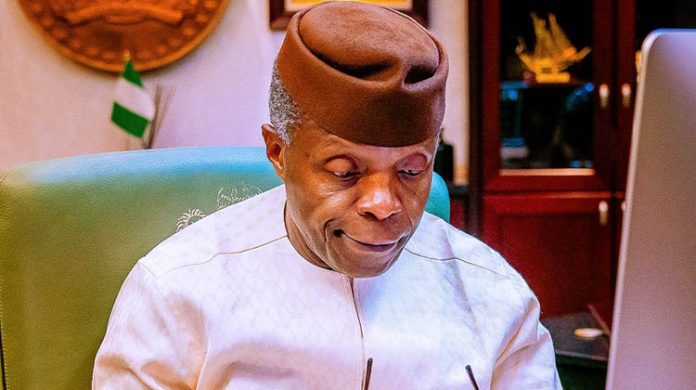VICE President Yemi Osinbajo has urged multilateral organizations to consider the huge obligations placed on African countries and adopt debt relief initiatives such as the Debt Service Suspension Initiative and the Common Framework for Debt Treatments.
The Vice President, who made the call while delivering a special address at the virtual edition of the 2022 World Economic Forum (WEF) Friday, said this should be done in a manner that would not further constrain the resumption of growth to the continent.
While noting that there were giant strides recorded across Africa, he pointed out that challenges still remained to overcome, saying, therefore, that “we need partnerships that help to tackle climate change, address security concerns, promote economic prosperity, combat disease and improve governance.”
READ ALSO: Osinbajo meets state governors over fuel subsidy, launches COVID-19 stimulus program
He urged the international community to support African countries to overcome fiscal challenges arising from their limited revenues.
According to him, “the creation of $650 billion in new Special Drawing Rights last year was a step in the right direction, but more needs to be done to enable African and other developing countries access the SDRs that are not needed or being used by developed or emerging economies.”
Prof. Osinbajo listed some of the progress on the African continent, including the recovery from the global pandemic, economic growth by 3.7% last year and a projected 3.8% growth in 2022.
He noted that there was now in place an African Continental Free Trade Area agreement to fast-track economic transformation just as the continent was making giant strides in agriculture, manufacturing and digital technology.
He further stated that in Nigeria for instance, six unicorns have emerged in the past six years.
The Vice President, who spoke on a wide range of issues, noted that it was time for the international community to “walk the talk” by meeting its commitments towards advancing growth in developing economies, especially climate changes obligations.
He called for a robust intervention of the international community to get rid of terrorists in Africa just as it was done in the Middle East.
According to Prof. Osinbajo: “African countries face a serious threat of terrorism arising from the encroachment of global terror groups and their franchises into Africa. It is imperative for the international community to make more robust interventions to clear terrorists from Africa just as it did in the Middle East and other parts of the world.
“The United Nations Security Council must find unanimity in working with and assisting African countries to eradicate the menace of terrorism in the continent once and for all.”
Also speaking on the climate change challenge, Osinbajo reiterated that “it is now common knowledge that Africa contributes least to climate change but has been most negatively affected by it. We must not allow this worrying situation to be compounded further by global inaction, processes and rules that make it difficult for Africa to adapt to climate change or indeed to develop.”
He restated his call for the international community to meet its pledge recently re-affirmed at COP-26 of providing $100 billion annually in climate finance to support climate change efforts in developing countries.
He added: “Although we in Africa are working towards the globally accepted net-zero future, we are also conscious that our energy needs are increasing with the growth in our economies.
“We need to ramp up energy access in response to this situation which is why the transition from fossil fuels to renewable energies must be just and fair. We are emphatic in our view that natural gas which Africa has in abundance must be accepted as a transition fuel. Moves in the international community especially by development finance institutions to defund gas projects will have severe implications in the medium to long-term for African economies and will slow down the process of phasing out more polluting fuels such as coal, diesel, and heavy fuel oil (HFO),” he added.
The vice president similarly called for partnership to tackle poverty, access vaccinations and achieve debt sustainability.
He added: “Economic recovery in Africa is contingent on the containment of the pandemic including through wide-spread vaccinations. Right now, less than 10% of African countries have vaccinated 40% of their population. The reality is that due to resource constraints, there will be a relatively slow rollout of vaccinations in Africa and that full national rollouts may take several years. The international community must accordingly support Africa with the resources including vaccine doses that will assist in making vaccinations available to all.”
On governance, Osinbajo called on the international community to support the efforts of West African leaders under the auspices of ECOWAS particularly, their condemnation of the incidences of coup d’etats and unconstitutional changes in government.
The vice president was among the 12 leaders chosen to present special addresses at this year’s WEP, which is being attended by about 25 Heads of State and Government.
























